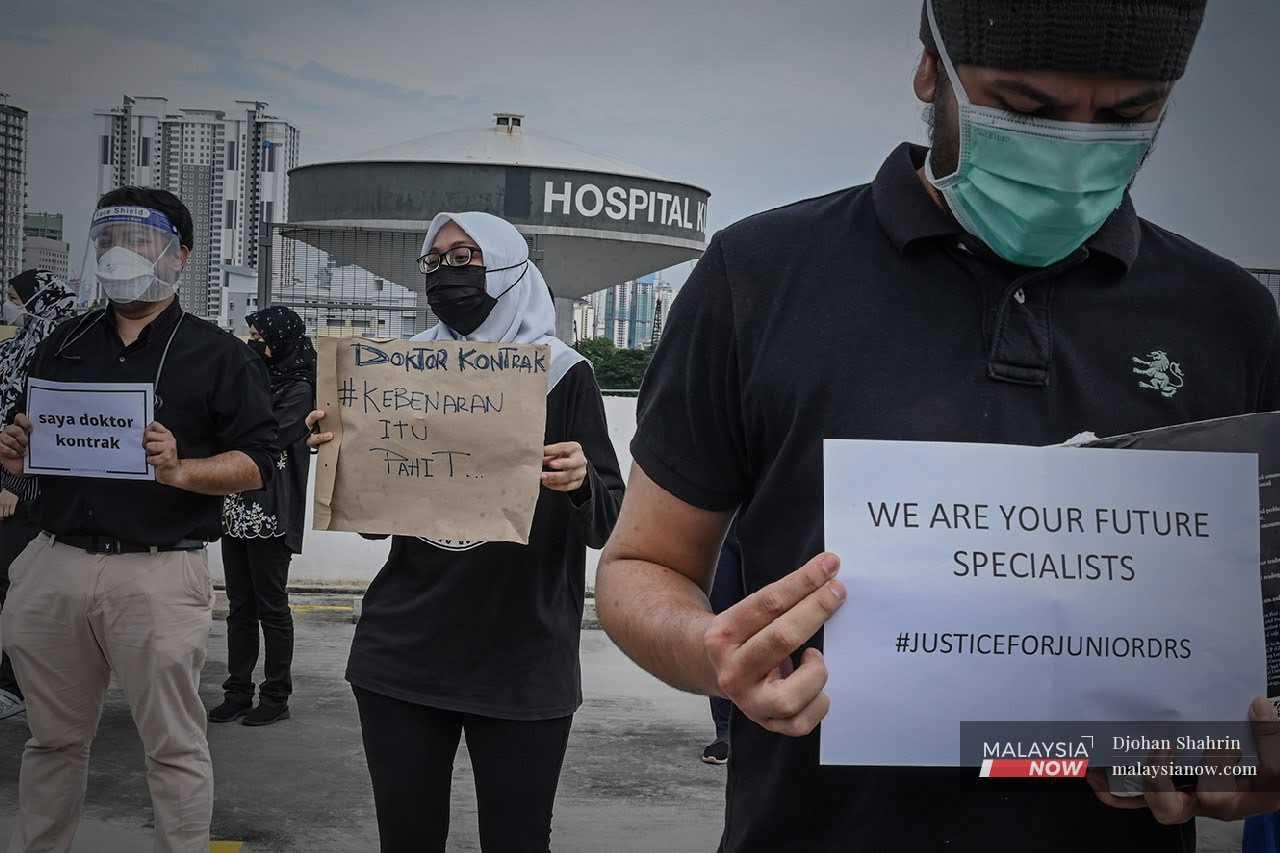A year after hartal, contract doctors still searching for hope
While some improvements have been made, they say this is still far short of their requests.
Just In
Nurul Humairah still remembers how she felt the day that she and her friends staged a protest outside their health clinic in Selangor one year ago.
She never imagined until then that she would need to leave her patients for a demonstration in order to demand guarantees for her future as a doctor – an occupation generally held in high public regard.
Up to the very last minute, her parents had begged her to remain in the hospital instead of joining the hartal movement outside.
But Nurul was determined to go.
"That morning, the ward was very quiet," she said. "The atmosphere was low because everyone knew there would be a hartal. But even the senior doctors, when we looked at them, told us to go.
"Outside the clinic, everyone saw us standing there holding our signs and placards. One of my friends began crying because she saw her father in the crowd.
"In the end, I began crying too behind my face mask."
Nurul was among the contract doctors throughout the country who went on strike a year ago, on July 26, 2021.
The movement, dubbed "Hartal Doktor Kontrak", was part of efforts to demand a guarantee of permanent employment for contract doctors, the right to an increase in salary, and welfare benefits equal to that of permanent doctors.
One year later, many of them are still struggling for a ray of hope in their careers.
The group's spokesman Dr Muhammad Yassin said since the hartal was held, a total of 4,000 permanent positions had been given by the government with 1,500 posts each year until 2025.
Contract doctors and dentists can also continue their studies in specialty programmes.
"This is a positive development given that before this, contract doctors could not become specialists," Yassin told MalaysiaNow.
Nevertheless, he said many medical officers were still quitting their jobs as the number of permanent positions remained much lower than the total number of contract doctors at just below 20,000.
'Disappointed'
The contract system was introduced by former prime minister Najib Razak for medical, dental and pharmacy graduates in the tabling of the 2017 Budget at the Dewan Rakyat, due to constraints on permanent positions.
At the end of May last year, about a month before the hartal was held, there were an estimated 35,216 contract appointments under the health ministry.
Of these, 23,007 were medical officers, 7,139 were pharmacy officers and 5,000 were dental officers.
A day before the strike, the government agreed to extend the contracts of 14,000 medical doctors, dentists and pharmacy officers for a period of two years, with an allocated expenditure of RM1.2 billion.
Yassin said given the shortfall in permanent posts, many contract doctors were still unable to land fixed positions.
"They are disappointed and have given up on the health ministry," he said.
"We asked for permanent positions but only 4,000 slots were given – far less than our request."
Their call for greater transparency in the appointment criteria for permanent posts also appears to have gone unheeded.
And other issues have entered the limelight since the hartal was held last year, including workplace bullying and the toxic work culture at public health facilities.
Citing the death of a trainee officer in Penang in April, Yassin said the group's calls had been fruitful as a task force was later established to investigate the matter.
The trainee doctor in Penang was the second young doctor to have died within a time span of two months.
In December 2020, another doctor was reported to have died soon after resigning from the same hospital.
Subscribe to our newsletter
To be updated with all the latest news and analyses daily.
